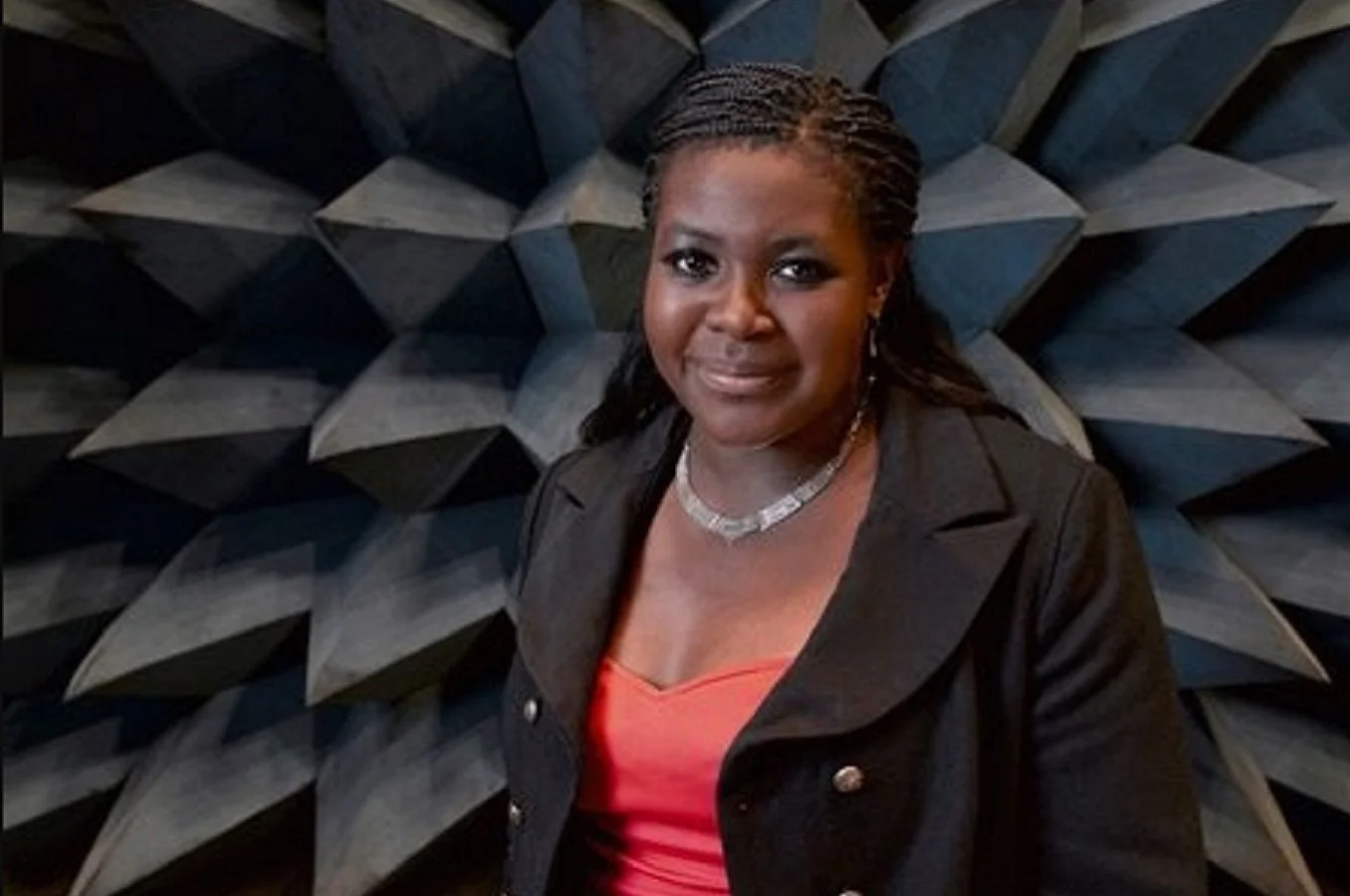Dr Maggie Aderin-Pocock - Inspiring Woman
Dr Maggie Aderin-Pocock MBE, is an award-winning British Space Scientist and Science Educator. She is an Honorary Research Associate in University College London's Department of Physics and Astronomy. Since February 2014, she has co-presented the long-running astronomy TV programme The Sky at Night.
Maggie was born in London in 1968, to Caroline Philips and Justus Adebayo Aderin, one of four daughters. Her father had emigrated from Nigeria and had harboured hopes and dreams of becoming a medical doctor in Britain - dreams that ultimately went unrealised when the demands of caring for a family took over. For him, education was key. Maggie remembers him saying “If you work hard, and you get an education, then the world is your oyster, you’ll be able to do anything you want.”
When I was at school, I was in the remedial class, at the back with the safety scissors, the coloured pens, you know, ‘just keep her out of the way’.
Her parents separated when she was four years old. Maggie and her sisters spent many years going back and forth, living with one parent and then the other, as custody battles ensued. Maggie attended 13 different schools in 14 years. She has dyslexia. For many years she wasn’t considered academically capable, and was held back and placed in remedial classes.“When I was at school, I was in the remedial class, at the back with the safety scissors, the coloured pens, you know, ‘Just keep her out of the way’. But when I started doing science, I realised I have an aptitude for science. I have a logical brain. I’ve got really good 3D geometry. And so science saved me from the doldrums.”She recalls the life-changing moment when she discovered her talent and passion for science – a teacher asked a question about the weight of a cubic centimetre of water. She calculated it quickly in her head and shot her hand up thinking “This is an easy one.” But when she looked around and no one else had their hand up she assumed she had it wrong, so put her hand back down. But then she thought “No. Give it a try”. She answered, correctly as it happened, and it was an ‘ah-ha’ moment – for her - and her teachers.
"In space, race doesn't matter, Nationality doesn't matter."
When Maggie was young, if people asked where she was from, she would say “Nigeria”, even though she’d never been there. She felt that it was easier than saying she was British, because she never really felt like she belonged. She believes her interest in space first stemmed from watching the children’s TV show The Clangers as a young child. She wanted to go and live with them. Life, for her, felt pretty complicated on earth, she thought that things would be much simpler in space. "In space, race doesn't matter, Nationality doesn't matter. In space, you see the world as a globe and you don't see the boundaries."
"If I can build something like this, then what else can I make?!’”
When she was 14 Maggie really wanted a telescope. She’d been given one but it didn’t work properly and she couldn’t afford to buy a better one. By chance, she saw an advertisement for an evening class in telescope making. She went along and was the only girl in a room full of middle-aged men. It wasn’t difficult but it took a long time –she rubbed two pieces of glass together with an abrasive power and after 6 months or more, she’d shaped a mirror and fine-tuned it. When she took it outside at night, even in London, she could see the craters of the moon through it! “But the magic was really, ‘I’ve made this! So what else can I do? If I can build something like this, then what else can I make?!’”“By having a dream, it spurs you on. And when you fall flat on your face and you think ‘Oh, everything’s gone wrong,’ you pick yourself up and say ‘Okay, the dream’s still there. Okay, there’s an obstacle, how do I get round this?’ ”As a space scientist, Maggie builds satellites that go into space. “Satellites do a myriad of different things. Some look out to the edges of the universe, others look back down on earth – how crops are growing, how ships are moving, if wars are still going on – so satellites are amazing, they can give us information about ourselves, but also the universe.”
"I’m a feminist, but I want equality for everybody. Race, creed, colour, gender - it doesn’t matter, equality all round!”
“Many of our sciences are dominated by men. And that’s not right. There are problems we face as women, there are problems that the world faces, and as women we bring our own viewpoint to it. If only 50% of the population is doing the science that we all need, then it’s very skewed in one direction.”“It’s not just getting the kids excited. It’s getting society excited. I always have a fear that I’ll go into a school and talk about space science and maybe a little girl will go home and say ‘Hey Dad, I heard about this today.’ And if her Dad turns around and says ‘Don’t worry, girls don’t do science’, then we’ve lost the battle.”“I’m a feminist, I want equality but I want equality for everybody. Race, creed, colour, gender - it doesn’t matter, equality all round!”At school, Maggie told a teacher that she wanted to be an astronaut but the teacher told her not to set her sights so high, and suggested she went into nursing instead because “It’s scientific too”. "I think she was trying to save me from pain, but I think that's wrong. I think people should aspire high and if I don't achieve my ultimate goal – I might never get into space – it doesn't matter, because I will have achieved so much more than if I hadn't tried."Maggie went on to study a bachelor degree in Physics at Imperial College London and a PhD in mechanical engineering from the same university. During her PhD studies, she met her husband, Dr Martin Pocock. They have one daughter, Laura, born in 2010.Maggie has worked on a huge variety of projects for private, government and academic intuitions – she has worked for the Ministry of Defence developing instruments to detect landmines, she was part of the team that developed the Gemini Telescope in Chile, which examines and analyses starlight to help better understand distant stars. She has worked as the lead scientist in the optical instrumentation team at aerospace manufacturer Astrium.She has a passion for inspiring the next generation to enter space science and set up a scheme called “Tours of the Universe” to engage people from all around the world in the wonders of space. She is a regular presenter on television for the long running BBC production, The Sky at Night, and others such as Do We Really Need the Moon? and In Orbit: How Satellites Rule Our World.In 2009, Maggie was awarded an MBE in the New Year’s Honours list for services to science education. She has received numerous awards, honorary doctorates and fellowships. In 2013, she was named in the UK Power List, as one of the UK top 10 most influential black people.We look forward to hearing more about what else Dr Aderin-Pocock will achieve. Perhaps she'll acheive her ultimate goal and one day head up into space. But even if she doesn't, she has already achieved so much on planet earth.Such an inspiring woman!


